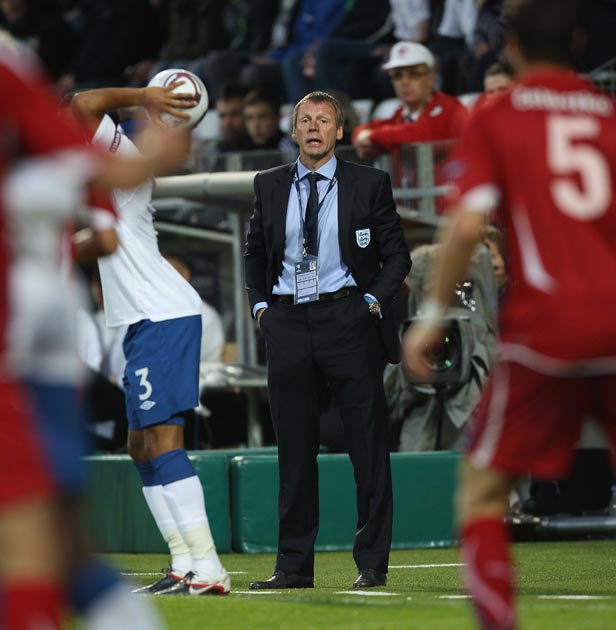England Under-21s lack character and creativity

Your support helps us to tell the story
From reproductive rights to climate change to Big Tech, The Independent is on the ground when the story is developing. Whether it's investigating the financials of Elon Musk's pro-Trump PAC or producing our latest documentary, 'The A Word', which shines a light on the American women fighting for reproductive rights, we know how important it is to parse out the facts from the messaging.
At such a critical moment in US history, we need reporters on the ground. Your donation allows us to keep sending journalists to speak to both sides of the story.
The Independent is trusted by Americans across the entire political spectrum. And unlike many other quality news outlets, we choose not to lock Americans out of our reporting and analysis with paywalls. We believe quality journalism should be available to everyone, paid for by those who can afford it.
Your support makes all the difference.For 14 short minutes on Sunday night, England were heading for a third successive semi-final in the European Under-21 Championship; but in far less convincing fashion than on the two previous occasions. Danny Welbeck's goal in the 75th minute was only their second in three matches and when the previously impressive defence made one slip it brought a crucial equalising goal for the Czech Republic, who needed only a draw to qualify and ended up scoring again with the last kick of the match. The Czechs now meet Switzerland in one semi-final tomorrow, while the favourites Spain play Belarus.
THREE THINGS THAT WENT WRONG
Not having the strongest available side
England have become resigned to travelling to international tournaments without anything up to half a dozen of their best players. This time, Micah Richards, Kieran Gibbs, Lee Cattermole and Liverpool's Martin Kelly were not fit. Andy Carroll, whose commitment to the Under-21s has been questionable, was left behind; Theo Walcott was deemed to have become a fully fledged senior international, as Carroll clearly feels himself to be; Chelsea's Josh McEachran played for the Under-19s instead and Jack Wilshere, keen to take part, was talked out of it when Arsenal produced detailed scientific evidence on his fitness that the Football Association did not have sufficient data of their own to challenge.
Lacking creativity and therefore goals
With neither Wilshere nor McEachran available, the midfield lacked a playmaker and was pedestrian throughout. Liverpool's expensive new signing Jordan Henderson sat very deep and hit neither accurate long passes nor penetrating shorter ones. Jack Rodwell, another industrious rather than constructive player, failed to make the most of his chance OPT CUT and neither Michael Mancienne nor Fabrice Muamba were in the side for their creative qualities.END CUT None of the wide players carried more than an occasional threat and Daniel Sturridge, who did so, started each of the three games in a different position while attempting to link up with Welbeck.
Too few characters in the squad
Largely because of withdrawals and unavailability, England had the youngest squad at the tournament, only five of them having played at a previous one. When the captain Mancienne was belatedly dropped, it was significant that the armband was given to Phil Jones, the youngest player but one in the 22. The goalkeeper Frankie Fielding was a strong character and one of the few vocal ones on the pitch and although Jones looks a natural leader, too few others did.
THREE WAYS TO IMPROVE
Decide what we want
The Spanish Under-21 side beaten surprisingly easily by England two years ago were missing six eligible players who earned a World Cup winners' medal 12 months later, because they were at the Confederations Cup instead; the coach said his aim was merely to develop players for the senior side. The FA seem to regard the Under-17s and Under-19s as development teams but Stuart Pearce has encouraged the notion that by Under-21 level learning to win matches and tournaments is as important as taking part. Hence his desire to take the strongest possible squad, often against the wishes of largely non-English Premier League managers.
Encourage skill and technique
Nobody at age-group tournaments ever faults the commitment and physical endeavour of England teams, but as the players grow
older these factors become less important than skill on the ball, vision and passing ability. Historically, English football has been distrustful of a Glenn Hoddle or a Matt Le Tissier; the emphasis is slowly changing under Sir Trevor Brooking's direction, with an emphasis for young players on smaller-sided games and more touches, but there is clearly a long way to go before finding the right balance.
Develop character and self-expression
According Danny Mills, who played at Under-21 level and then the 2002 World Cup and was working here for Radio 5 Live, club academies are developing "robotic players, who have had everything done for them from the age of nine and can't think for themselves." Mills believes: "We have to realise the old English style of football isn't quite good enough to compete at the very highest level and that's why we haven't won anything since 1966. The players have got to be able to express themselves out there and the shackles have to be released."
Join our commenting forum
Join thought-provoking conversations, follow other Independent readers and see their replies
Comments